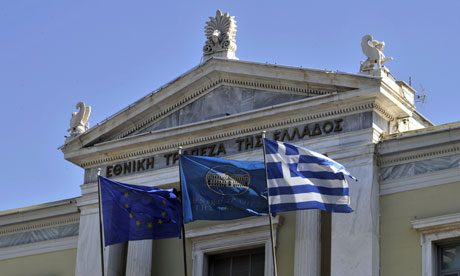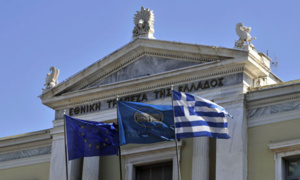Currently, short-term papers, the main source of liquidity for the Government of Greece, are suffering from a lack of finance.
ECB Single Supervisory Mechanism (SSM) is concerned about the risk of default associated with such debt. Earlier the management of SSM urges Greece banks not to be led by the country's government, which insists on the redemption of short-term bonds issued in full.
On Wednesday, outflow of deposits from Greek banks amounted to 300 million euros, the highest since the February deal bargain with creditors to extend financial assistance.
ECB decided to increase the upper limit of the program of emergency lending to Greek banks up to 400 million euros - to 69.8 billion euros.
It is worth recalling that the officials of the International Monetary Fund said to colleagues from the Eurozone that Greece is "the most difficult customer" of all those with whom the fund had to deal with over 70 years of its history, Bloomberg reported, citing informed sources.
During a short and very emotional conference on Tuesday, representatives of the IMF, the European Central Bank and the European Commission have expressed outrage at the failure to comply with conditions of February deal with Greece to extend the term of the international financial assistance. Panelists also claimed that Greece is out of cooperation with creditors.
In particular, representatives of the Ministry of Finance of Germany said that attempts to persuade the government of Greece in the necessary of austerity are fruitless, comparing them with riding a dead horse. A team from the IMF announced that the Greek attitude to creditors is unacceptable.
Among analysts and officials is growing concern about the intransigence of the Greek cabinet led by Alexis Tsipras, which can lead to the fact that Greece will leave the Eurozone. In recent days, economists of Morgan Stanley, UniCredit and Fitch Ratings expressed such concerns too.
In particular, the European Commissioner for Economic and Financial Affairs Pierre Moscovici admitted the possibility of a Greek exit from the Eurozone in the interview with Die Welt on Wednesday.
Brussels is prepared to meet Greece, if the government in Athens will show a willingness to cooperate. According to EU Commissioner, the parties understood that the third package of financial aid to Greece would look different from the previous two.
Meanwhile Tsipras still has strong expectation for the meeting with German Chancellor Angela Merkel and the ECB on the sidelines of an EU summit in Brussels on 19-20 March, says Bloomberg. March 23, the Greek government will visit Berlin at the invitation of Merkel.
Greece requires additional liquidity from international lenders within the already promised funds, or money from her government may end in March.
ECB Single Supervisory Mechanism (SSM) is concerned about the risk of default associated with such debt. Earlier the management of SSM urges Greece banks not to be led by the country's government, which insists on the redemption of short-term bonds issued in full.
On Wednesday, outflow of deposits from Greek banks amounted to 300 million euros, the highest since the February deal bargain with creditors to extend financial assistance.
ECB decided to increase the upper limit of the program of emergency lending to Greek banks up to 400 million euros - to 69.8 billion euros.
It is worth recalling that the officials of the International Monetary Fund said to colleagues from the Eurozone that Greece is "the most difficult customer" of all those with whom the fund had to deal with over 70 years of its history, Bloomberg reported, citing informed sources.
During a short and very emotional conference on Tuesday, representatives of the IMF, the European Central Bank and the European Commission have expressed outrage at the failure to comply with conditions of February deal with Greece to extend the term of the international financial assistance. Panelists also claimed that Greece is out of cooperation with creditors.
In particular, representatives of the Ministry of Finance of Germany said that attempts to persuade the government of Greece in the necessary of austerity are fruitless, comparing them with riding a dead horse. A team from the IMF announced that the Greek attitude to creditors is unacceptable.
Among analysts and officials is growing concern about the intransigence of the Greek cabinet led by Alexis Tsipras, which can lead to the fact that Greece will leave the Eurozone. In recent days, economists of Morgan Stanley, UniCredit and Fitch Ratings expressed such concerns too.
In particular, the European Commissioner for Economic and Financial Affairs Pierre Moscovici admitted the possibility of a Greek exit from the Eurozone in the interview with Die Welt on Wednesday.
We will not seek to hold Greece in the euro zone at any price, but only in cases where strict rules are acceptable to both sides.At the same time, he stressed that this step will negatively affect the monetary union, reports Deutsche Welle. Euro is a single currency. If the Eurozone will lose some part, the damage will be caused to the monetary union as a whole, - said Moscovisi.
Brussels is prepared to meet Greece, if the government in Athens will show a willingness to cooperate. According to EU Commissioner, the parties understood that the third package of financial aid to Greece would look different from the previous two.
Meanwhile Tsipras still has strong expectation for the meeting with German Chancellor Angela Merkel and the ECB on the sidelines of an EU summit in Brussels on 19-20 March, says Bloomberg. March 23, the Greek government will visit Berlin at the invitation of Merkel.
Greece requires additional liquidity from international lenders within the already promised funds, or money from her government may end in March.






